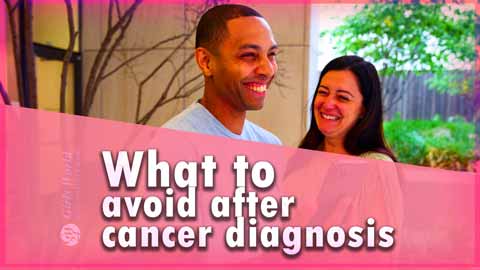What Not to Do When Diagnosed with Cancer
Table of Contents
- Introduction
- Don’t Panic or Lose Hope
- Don’t Google Excessively or Trust Unverified Information
- Don’t Rush into Major Decisions Without a Second Opinion
- Don’t Isolate Yourself
- Don’t Ignore Your Mental Health
- Don’t Neglect Your Physical Health
- Don’t Try Unproven Alternative Therapies Without Consulting Your Doctor
- Don’t Avoid Difficult Conversations
- Conclusion: Prioritize Your Well-Being
1. Introduction
What Not to Do When Diagnosed with Cancer: Avoid These Common Mistakes – Receiving a cancer diagnosis is a life-changing moment. It’s natural to feel a whirlwind of emotions like fear, confusion, and uncertainty about the future. While navigating through this challenging journey, it’s important to know that your actions and decisions can have a significant impact on your mental, emotional, and physical well-being. There are certain things that you should avoid doing immediately after a diagnosis to set yourself up for a more manageable and positive experience.
In this guide, we will explore the key things What not to do when diagnosed with cancer, Mistakes to avoid with cancer diagnosis, Cancer diagnosis tips, What to avoid after cancer diagnosis, Common mistakes after cancer diagnosis – along with helpful suggestions on what to do instead.
The Secrets of Normal Delivery: 8 Proven Strategies
2. Don’t Panic or Lose Hope
Upon receiving a cancer diagnosis, panic is a common reaction. It’s easy to feel overwhelmed by the enormity of the situation, but it’s crucial to remember that cancer treatment has advanced dramatically in recent years. Panic can cloud your judgment, making it harder to think clearly and make informed decisions about your treatment options.
Why You Should Avoid Panicking
– Impact on Mental Health: Unchecked panic can lead to heightened stress and anxiety, which could weaken your immune system and hinder your body’s ability to respond to treatment.
– Rational Decision Making: Panicking can prevent you from clearly assessing your options or seeking second opinions from medical professionals.
What to Do Instead
Take a deep breath and remind yourself that you have options. Start by learning more about your diagnosis from credible sources such as the American Cancer Society or your healthcare provider. Engage with support groups or mental health professionals to help manage your emotional well-being during this critical time.
3. Don’t Google Excessively or Trust Unverified Information
One of the most common mistakes people make after being diagnosed with cancer is turning to the internet for information. While it’s important to educate yourself about your condition, the internet is flooded with unverified, misleading, and often frightening information that could increase your anxiety and steer you toward ineffective treatments.
Why Excessive Googling Is Harmful
– False Information: Many websites offer inaccurate or incomplete data, especially when it comes to survival rates or unproven treatments.
– Increased Anxiety: Reading worst-case scenarios can exacerbate your fears and make your diagnosis seem more hopeless than it is.
What to Do Instead
Limit your online research to trusted medical websites, such as the Mayo Clinic, the National Cancer Institute, or Cancer Research UK. Ask your oncologist for reliable resources tailored to your diagnosis and make a list of questions to discuss during appointments.
4. Don’t Rush into Major Decisions Without a Second Opinion
Cancer can create a sense of urgency, but it’s important not to make hasty decisions about treatment without fully exploring your options. Whether it’s choosing a treatment plan or a specific doctor, rushing can lead to choices you might later regret.
Why You Shouldn’t Rush
– Missed Treatment Options: Each cancer case is unique, and there might be multiple treatment approaches available. Rushing can lead to missing out on less invasive or more effective options.
– Pressure from Fear: A cancer diagnosis can push people into agreeing to treatments out of fear, without fully understanding their benefits and side effects.
What to Do Instead
Before making major decisions, seek a second or even third opinion from another oncologist. Different doctors may offer varying perspectives on your treatment options. Some might suggest clinical trials or alternative therapies you didn’t initially consider.
5. Don’t Isolate Yourself
Many people feel the instinct to withdraw and isolate themselves after a cancer diagnosis. This reaction may come from not wanting to burden others, or because they don’t know how to express what they are going through. However, isolation can make an already difficult situation even harder.
Why Isolation Is Dangerous
– Mental Health Impact: Being alone with your thoughts can amplify negative emotions like fear, sadness, and depression.
– Lack of Support: Without a network of family, friends, or fellow cancer survivors, it’s harder to cope emotionally and practically.
What to Do Instead
Reach out to loved ones and let them know how you’re feeling. Many people will want to help but won’t know how unless you tell them. Consider joining a support group—whether online or in person—where you can share experiences with others going through the same thing. The emotional connection can provide strength and perspective.
READ MORE
6. Don’t Ignore Your Mental Health
Cancer affects more than just your physical health. The emotional toll it takes is immense, and ignoring your mental health can worsen your overall well-being and possibly interfere with your recovery.
Why Mental Health Matters
– Impact on Treatment: Stress, anxiety, and depression can all have a negative effect on your body’s ability to heal and respond to treatment.
– Quality of Life: Your emotional state can greatly influence how you approach your diagnosis, treatment, and recovery.
What to Do Instead
Talk to a mental health professional who specializes in working with cancer patients. Therapists, counselors, and psychologists can offer coping strategies tailored to the unique challenges of living with cancer. In addition, practices such as mindfulness, meditation, or yoga can help manage stress and promote relaxation.
7. Don’t Neglect Your Physical Health
After a cancer diagnosis, it’s easy to focus entirely on treatments like surgery, chemotherapy, or radiation. However, maintaining your physical health through proper nutrition and exercise can be just as important in improving your overall well-being.
Why Physical Health Is Important
– Boost Immune Function: Proper nutrition and regular exercise can support your immune system, making it easier to fight off infections during treatment.
– Improved Energy Levels: Physical activity can help combat the fatigue that often accompanies cancer treatments.
What to Do Instead
Work with a nutritionist to develop a diet plan that supports your treatment and overall health. Focus on nutrient-dense foods such as fruits, vegetables, lean proteins, and whole grains. Incorporate light physical activities like walking or yoga into your daily routine to keep your body strong.
8. Don’t Try Unproven Alternative Therapies Without Consulting Your Doctor
When facing a cancer diagnosis, you might be tempted to try alternative treatments, especially if you’re looking for something with fewer side effects than traditional therapies. However, many alternative treatments lack scientific backing and can interfere with conventional cancer treatments.
Why You Should Avoid Unproven Therapies
– Health Risks: Some alternative treatments can be harmful or interact negatively with standard treatments.
– False Hope: Unproven therapies may offer false hope, wasting valuable time and resources that could be better spent on evidence-based treatments.
What to Do Instead
If you’re interested in complementary therapies, such as acupuncture or herbal supplements, consult with your oncologist first. Many doctors are open to integrating complementary therapies, but they will help you choose options that are safe and won’t interfere with your treatment plan.
9. Don’t Avoid Difficult Conversations
It can be tempting to avoid difficult conversations about your diagnosis—whether it’s with family, friends, or even your medical team. However, not discussing your feelings or concerns can lead to misunderstandings, resentment, or loneliness.
Why Communication Is Key
– Emotional Support: Openly communicating with loved ones can provide you with the emotional support you need to cope.
– Better Understanding: Being honest with your medical team can help them understand your preferences and tailor treatment to your needs.
What to Do Instead
Approach these conversations with honesty and patience. Share your thoughts and feelings with those closest to you, and don’t be afraid to express your fears and concerns. In doing so, you can build a network of support that will be invaluable throughout your journey.
10 Conclusion: Prioritize Your Well-Being
A cancer diagnosis is a life-altering event, and it’s easy to feel like everything is spinning out of control. However, by avoiding these common mistakes and focusing on emotional, mental, and physical health, you can take a proactive approach to your treatment and overall well-being.
Stay informed, build a strong support network, and work closely with your healthcare team to make informed decisions. Above all, don’t forget to take care of your mental health as you navigate this challenging journey.
Resources:
Our Sections
Explore our Fitness section and gain valuable insights to support your wellness journey.
Check out our Health section for essential information on maintaining a balanced lifestyle.
Discover our Beauty Skincare section for expert tips and advice to enhance your skincare routine.
Visit our Nutrition section for guidance on improving your diet and overall health.
Dive into our Lifestyle section for articles that enrich your daily life.
Explore our Pregnancy section for support and information during this special time.
Browse our Resources section for a variety of helpful articles.
Don’t forget to visit and subscribe to our YouTube channel for more content and updates!



